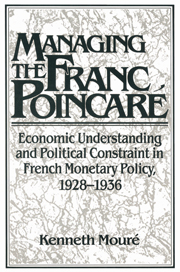 Managing the Franc Poincaré
Managing the Franc Poincaré Book contents
- Frontmatter
- Contents
- List of figures and tables
- Acknowledgments
- Abbreviations used in the notes
- Introduction
- 1 The depression in France
- 2 French gold accumulation, 1928–1932
- 3 The World Economic Conference and the gold bloc
- 4 The Bank of France: market control and interest-rate policy
- 5 The Treasury and government finance
- 6 The devaluation debate
- 7 Devaluation of the franc
- Conclusion
- Appendix
- Bibliography
- Index
Conclusion
Published online by Cambridge University Press: 23 November 2009
- Frontmatter
- Contents
- List of figures and tables
- Acknowledgments
- Abbreviations used in the notes
- Introduction
- 1 The depression in France
- 2 French gold accumulation, 1928–1932
- 3 The World Economic Conference and the gold bloc
- 4 The Bank of France: market control and interest-rate policy
- 5 The Treasury and government finance
- 6 The devaluation debate
- 7 Devaluation of the franc
- Conclusion
- Appendix
- Bibliography
- Index
Summary
Defending the devaluation in the Chamber of Deputies, Léon Blum invoked the example of Franklin Roosevelt to justify his abandonment of the franc Poincaré: “The Roosevelt experiment takes its exceptional character from Roosevelt's courage in trying one method after another, so as not to persist obstinately, against the evidence of experience, but rather to try alternatives until finally he finds a means that will succeed”. Blum overestimated the success of Roosevelt's “revolution” in America, but he was surely correct in stressing its spirit, which Roosevelt himself characterized as “bold, persistent experimentation”. It is tempting to declare that the opposite was true of France; that until the Popular Front, the French persisted in the obstinate application of one policy, deflation, despite the steadily accumulating evidence of its failure abroad and its inability to bring recovery in France. This persistence weakened French economic and financial power in the 1930s, earning a share of the blame for the fall of France in 1940.
Such a judgment contains a large element of truth, but it slights aspects of the French experience that are important in explaining the nature and logic of French policy during the Great Depression. The first is the coherence and cohesiveness of policy makers' understanding of the depression, which shaped their agenda for dealing with the slump. As shown by their reactions to the arrival of the depression in France, the international gold problem from 1928 to 1932, and French efforts at international cooperation, policy makers responded to the crisis with the lessons they had learned from the 1920s experience of inflation and currency depreciation resulting from budget deficits. They saw the crisis as essentially monetary in origin.
- Type
- Chapter
- Information
- Managing the Franc PoincaréEconomic Understanding and Political Constraint in French Monetary Policy, 1928–1936, pp. 274 - 280Publisher: Cambridge University PressPrint publication year: 1991


